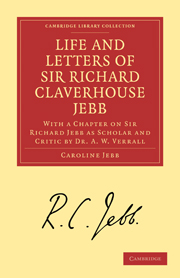 Life and Letters of Sir Richard Claverhouse Jebb, O. M., Litt. D.
Life and Letters of Sir Richard Claverhouse Jebb, O. M., Litt. D. Book contents
- Frontmatter
- PREFACE
- Contents
- CHAPTER I Family History
- CHAPTER II 1841—1858: Childhood and School Days
- CHAPTER III 1858—1862: Undergraduate Years
- CHAPTER IV 1862—1864: Fellowship and College Work.—Tour in Egypt
- CHAPTER V 1865—1870: Diary and Letters.—Public Oratorship
- CHAPTER VI 1871—1872: Letters to C. L. S.
- CHAPTER VII 1872—1874: Cambridge Life and Work
- CHAPTER VIII 1874—1878: Marriage.—Election to Glasgow Chair. Inaugural Address. Letters by Rev. Dr Denney, and Mr R. P. G. Williamson, M.A.—Visit to Italy and Greece.—Illness
- CHAPTER IX 1878—1880: British School at Athens. Hellenic Society.—Visit to Paris.—Challenge by Dr Blackie.—Visit to Venice
- CHAPTER X 1881—1883: Springfield.—Bentley.—Attack on Glasgow University.—The Troad.—School at Athens
- CHAPTER XI 1883—1889: Visit to America.—Professor Fawcett.—Death of Mr Robert Jebb.—Royal Academy.—Ode to Bologna.—Resignation of Greek Chair in Glasgow
- CHAPTER XII 1889—1894: Regius Professor of Greek at Cambridge.—Rede Lecture.—Election to Parliament. First Speech
- CHAPTER XIII 1894—1896: The Welsh Church Disestablishment Bill. Speech.—Illness
- CHAPTER XIV 1896—1898: Conference on Secondary Education.—Visit to the Riviera.—Voluntary Schools' Grant Bill. Sir John Gorst's Education Bill. Burial Grounds Committee
- CHAPTER XV 1898—1900: Death of Mr Gladstone.—Speech on the Rating of Clergymen.—Letters.—Romanes Lecture.—War. Consultation's Committee.—Knighthood
- CHAPTER XVI 1900—1901: Re-election.—Death of the Queen.—Deputation to Mr Balfour.—Irish University Commission
- CHAPTER XVII 1902—1903: British Academy.—Education Bill.—Tercentenary of Bodleian Library.—Trustee of British Museum.—Memorial Cloister at Charterhouse
- CHAPTER XVIII 1904—1905: Letters.—Order of Merit.—Defeat of Government
- CHAPTER XIX 1905: Visit to South Africa.—Last Illness
- The Scholar and Critic
- Index
CHAPTER III - 1858—1862: Undergraduate Years
Published online by Cambridge University Press: 07 September 2010
- Frontmatter
- PREFACE
- Contents
- CHAPTER I Family History
- CHAPTER II 1841—1858: Childhood and School Days
- CHAPTER III 1858—1862: Undergraduate Years
- CHAPTER IV 1862—1864: Fellowship and College Work.—Tour in Egypt
- CHAPTER V 1865—1870: Diary and Letters.—Public Oratorship
- CHAPTER VI 1871—1872: Letters to C. L. S.
- CHAPTER VII 1872—1874: Cambridge Life and Work
- CHAPTER VIII 1874—1878: Marriage.—Election to Glasgow Chair. Inaugural Address. Letters by Rev. Dr Denney, and Mr R. P. G. Williamson, M.A.—Visit to Italy and Greece.—Illness
- CHAPTER IX 1878—1880: British School at Athens. Hellenic Society.—Visit to Paris.—Challenge by Dr Blackie.—Visit to Venice
- CHAPTER X 1881—1883: Springfield.—Bentley.—Attack on Glasgow University.—The Troad.—School at Athens
- CHAPTER XI 1883—1889: Visit to America.—Professor Fawcett.—Death of Mr Robert Jebb.—Royal Academy.—Ode to Bologna.—Resignation of Greek Chair in Glasgow
- CHAPTER XII 1889—1894: Regius Professor of Greek at Cambridge.—Rede Lecture.—Election to Parliament. First Speech
- CHAPTER XIII 1894—1896: The Welsh Church Disestablishment Bill. Speech.—Illness
- CHAPTER XIV 1896—1898: Conference on Secondary Education.—Visit to the Riviera.—Voluntary Schools' Grant Bill. Sir John Gorst's Education Bill. Burial Grounds Committee
- CHAPTER XV 1898—1900: Death of Mr Gladstone.—Speech on the Rating of Clergymen.—Letters.—Romanes Lecture.—War. Consultation's Committee.—Knighthood
- CHAPTER XVI 1900—1901: Re-election.—Death of the Queen.—Deputation to Mr Balfour.—Irish University Commission
- CHAPTER XVII 1902—1903: British Academy.—Education Bill.—Tercentenary of Bodleian Library.—Trustee of British Museum.—Memorial Cloister at Charterhouse
- CHAPTER XVIII 1904—1905: Letters.—Order of Merit.—Defeat of Government
- CHAPTER XIX 1905: Visit to South Africa.—Last Illness
- The Scholar and Critic
- Index
Summary
Jebb came up to Cambridge in October, 1858, under good auspices. His reputation from Charterhouse preceded him, and he was fortunate in having that great scholar, Dr Lightfoot, late Bishop of Durham, for his tutor. He was very young, having attained the age of seventeen only five weeks before, on August 27th. Mr Jebb had felt much doubt about the advisability of allowing him to come up this year, but the general opinion was in favour, and the boy himself was set against delay.
His friend, the Vice-Provost of Eton, describes the impression made on his contemporaries at this time.
” It was in October 1858 that I went to Bishop's Hostel, being then in my second year, to call on the famous freshman. There is always a famous freshman: the year before it was Trevelyan, from Harrow; that year it was Jebb, from Charterhouse. The impression then received has only been deepened in the years that have followed; an impression of force and refinement, shyness and courtesy, pungency and kindliness, readiness and reserve, composing a character the attraction of which was heightened by a sense of enigma in an appearance of elaborateness without affectation. Here was a person whom you were not likely to know at once, nor beyond your own limitations ever; but how well worth knowing, so far as he would grant it! We were told, and we easily believed, that he came up to Cambridge at seventeen, because he had learnt all that Charterhouse could teach him. He appeared here with a kind of nimbus of distinction, and it never left him. […]
- Type
- Chapter
- Information
- Life and Letters of Sir Richard Claverhouse Jebb, O. M., Litt. D.With a Chapter on Sir Richard Jebb as Scholar and Critic by Dr. A. W. Verrall, pp. 20 - 55Publisher: Cambridge University PressPrint publication year: 2010First published in: 1907


